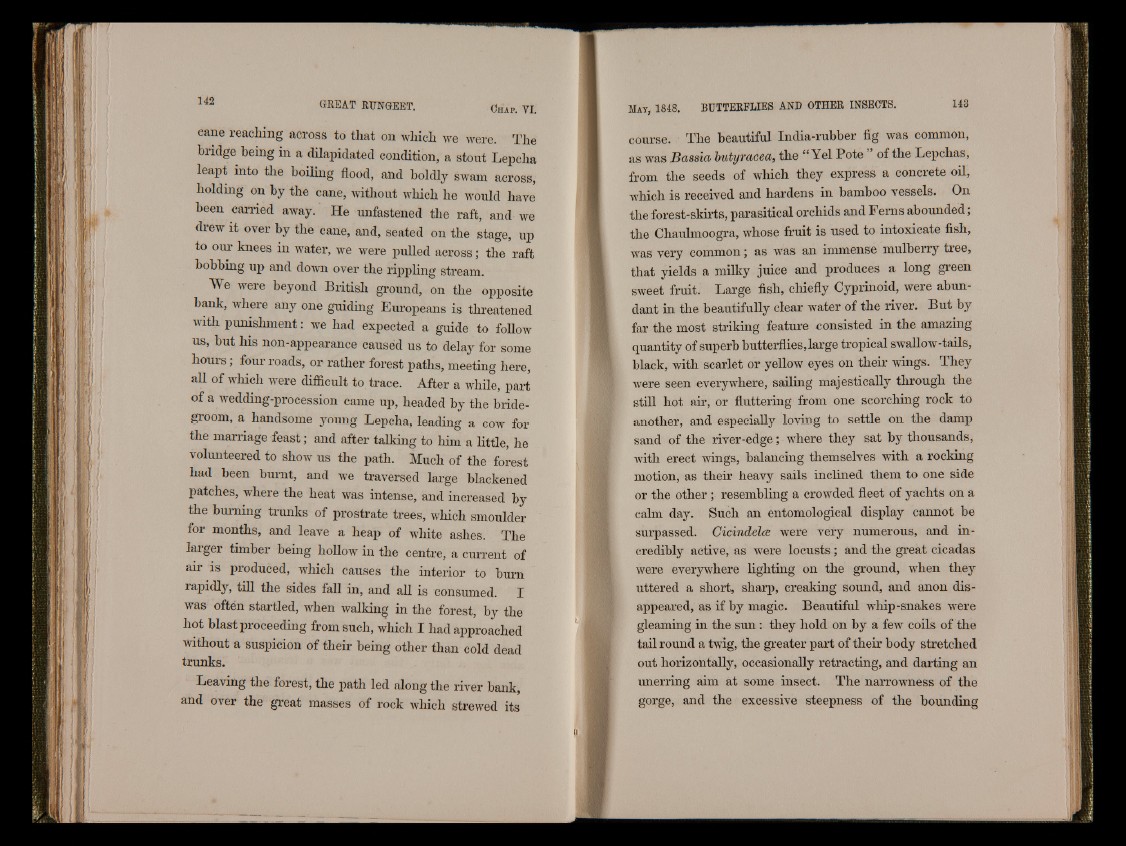
eane reaching across to that on which we were. The
bridge being in a dilapidated condition, a stout Lepcha
leapt into the boiling flood, and boldly swam across,
holding on by the cane, without which he would have
been carried away. He unfastened the raft, and we
drew it over by the cane, and, seated on the stage, up
to our knees in water, we were pulled across; the raft
bobbing up and down over the rippling stream.
We were beyond British ground, on the opposite
bank, where any one guiding Europeans is threatened
with punishment: we had expected a guide to follow
us, but his non-appearance caused us to delay for some
hours; four roads, or rather forest paths, meeting here,
ah of which were difficult to trace. After a while, part
of a wedding-procession came up, headed by the bridegroom,
a handsome young Lepcha, leading a cow for
the marriage feast; and after talking to him a little, he
volunteered to show us the path. Much of the forest
had been burnt, and we traversed large blackened
patches, where the heat was intense, and increased by
the burning trunks of prostrate trees, which smoulder
for months, and leave a heap of white ashes. The
larger timber being hoUow in the centre, a current of
air is produced, which causes the interior to burn
rapidly, tiU the sides fall in, and all is consumed. X
was often startled, when walking in the forest, by the
hot blast proceeding from such, which I had approached
without a suspicion of their being other than cold dead
trunks.
Leaving the forest, the path led along the river bank,
and over the great masses of rock which strewed its
course. The beautiful India-rubber fig was common,
as was Bassia butyracea, the “ Yel Pote of the Lepchas,
from the seeds of which they express a concrete oil,
which is received and hardens in bamboo vessels. On
the forest-skirts, parasitical orchids and Ferns abounded,
the Chaulmoogra, whose fruit is used to intoxicate fish,
was very common; as was an immense mulberry tree,
that yields a milky juice and produces a long green
sweet fruit. Large fish, chiefly Cyprinoid, were abundant
in the beautifully clear water of the river. But by
far the most striking feature consisted in the amazing
quantity of superb butterflies, large tropical swallow-tails,
black, with scarlet or yellow eyes on their wings. They
were seen everywhere, sailing majestically through the
still hot air, or fluttering from one scorching rock to
another, and especially loving to settle on the damp
sand of the river-edge; where they sat by thousands,
with erect wings, balancing themselves with a rocking
motion, as their heavy sails inclined them to one side
or the other; resembling a crowded fleet of yachts on a
calm day. Such an entomological display cannot be
surpassed. Gicindelce were very numerous, and incredibly
active, as were locusts; and the great cicadas
were everywhere lighting on the ground, when they
uttered a short, sharp, creaking sound, and anon disappeared,
as if by magic. Beautiful whip-snakes were
gleaming in the sun: they hold on by a few coils of the
tail round a twig, the greater part of their body stretched
out horizontally, occasionally retracting, and darting an
unerring aim at some insect. The narrowness of the
gorge, and the excessive steepness of the bounding